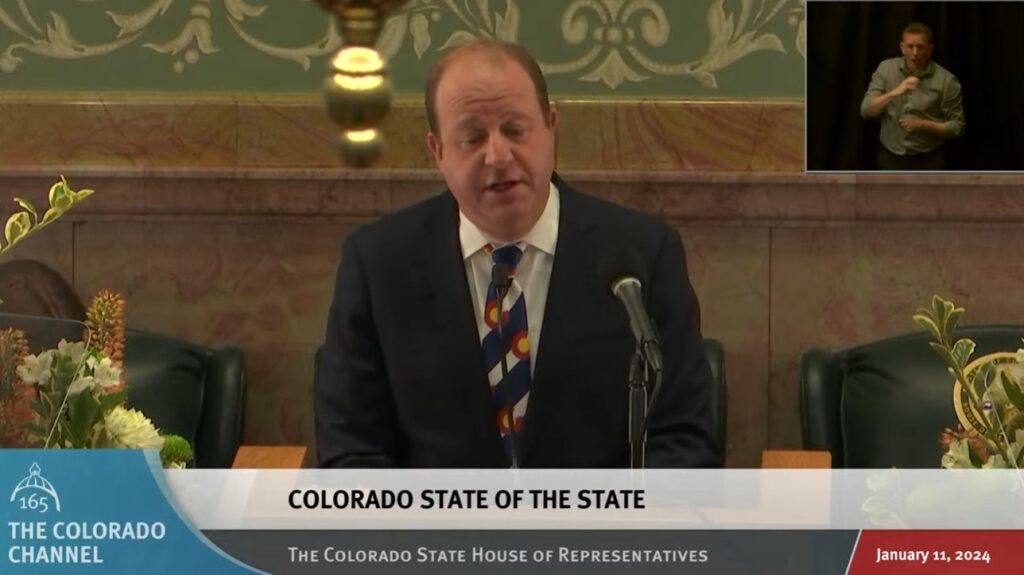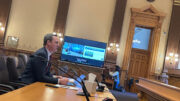By Jeffrey A. Roberts
CFOIC Executive Director
Citing the separation of powers as “a core tenet of our democracy,” Gov. Jared Polis on Tuesday signed into law a bill that narrows the definition of “public business” in the Colorado Open Meetings Law as it applies to the legislature and lets members of the General Assembly communicate by email and text message without it being a “meeting” under the law.
In approving a significant change to the government-transparency law first initiated by the voters of Colorado in 1972, Polis wrote, “I respect this path passed by both chambers of the Legislature, and recognize the separate and distinct authority of the Legislature to determine, within reason, their own procedures to maintain transparency while modernizing and adapting the Legislative Branch to an ever-evolving society.”

“As a coequal branch of government, the Executive should rarely intrude on the inner workings of the Legislature, and the Executive Branch warrants the same deference from the Legislature on its internal operations,” he added.
The quick-moving Senate Bill 24-157 had received final approval in the Colorado House just a day earlier, ironically at the start of Sunshine Week, a national celebration of federal and state open-government laws. Because the bill includes a safety clause, it went into effect immediately with the governor’s signature.
The new law comes after the legislature was sued twice in the past year over open meetings issues, with a judge ruling in January that its use of an anonymous “quadratic voting” system to rank bills violated the statute and the House agreeing last September to bar representatives from auto-deleting messages exchanged among themselves.
Democratic leaders of both Houses, including Senate President Steve Fenberg of Boulder and House Speaker Julie McCluskie of Dillon, were the primary sponsors of SB 24-157. Fenberg said in a committee hearing he’d been working on the legislation for more than a year to “create clarity, to codify what is essentially current guidance that we already operate under and to remove gray areas so that everyone has a shared understanding of how to follow the law.”
“The purpose of the bill was never to reduce transparency in any way,” he said in response to concerns raised by groups including the Colorado Freedom of Information Coalition.
“It is profoundly disappointing that the leadership of both houses, and the governor, have chosen to effectively exempt one branch of government from our state’s public transparency law,” said CFOIC president Steve Zansberg. “It is all the more so, given that our organization’s input was completely ignored, and that they did so during National Sunshine Week of 2024.”
Passed 52 years ago as part of the Sunshine Act of 1972, the open meetings law declares — and still declares — it to be “a matter of statewide concern and the policy of this state that the formation of public policy is public business and may not be conducted in secret.”
The law requires state public bodies such as the legislature and its committees to open meetings of two or more members at which public business is discussed or formal action is taken. “Full and timely” notice is required before meetings at which the adoption of any proposed policy, position, resolution, rule, regulation or formal action occurs or at which a majority or quorum is expected to be in attendance. Minutes must be “taken and promptly recorded.”
But under SB 24-157, notice will only be required for the legislature if a quorum is “contemporaneous,” allowing for smaller-group meetings on the same topic and discussions by phone, email and text message that the public may never know about. Public business is defined as it applies to the General Assembly to mean only introduced legislation, resolutions and other matters before a committee. It could also mean draft legislation discussed by a quorum of a committee during a legislative session or by a quorum of an interim committee.
Additionally, “any form of written communication, electronic or otherwise, exchanged by two or more members of the General Assembly” would not be subject to the open meetings law, but any records of those communications would still be subject to disclosure “to the extent required by the Colorado Open Records Act.”
“We exist now in a digital age, where cellphones, email communication, written communication happens at a lightning pace and is something that a 1972 law could never contemplate or imagine,” McCluskie said during second reading on the bill in the House last Friday. “The democratic process thrives when we make connections, invest in understanding each other, listen to one another, connect and learn.”
In committee testimony, CFOIC said the bill will encourage state lawmakers to formulate and debate public business in an unlimited way via email, text message and ephemeral messaging apps such as Signal without the public’s knowledge and scrutiny. If such electronic communications haven’t already been deleted, we stressed, they likely would not be available to request because CORA excludes “[a]ll documents prepared or assembled by a member of the general assembly relating to the drafting of bills or amendments” from the definition of “public records.” Those are considered “work product.”
SB 24-157 requires legislative leaders over the next three years to discuss the open meetings law as it applies to the General Assembly during meetings of their executive committee and to take public comment during such meetings.
Follow the Colorado Freedom of Information Coalition on Twitter @CoFOIC. Like CFOIC’s Facebook page. Do you appreciate the information and resources provided by CFOIC? Please consider making a tax-deductible donation.




